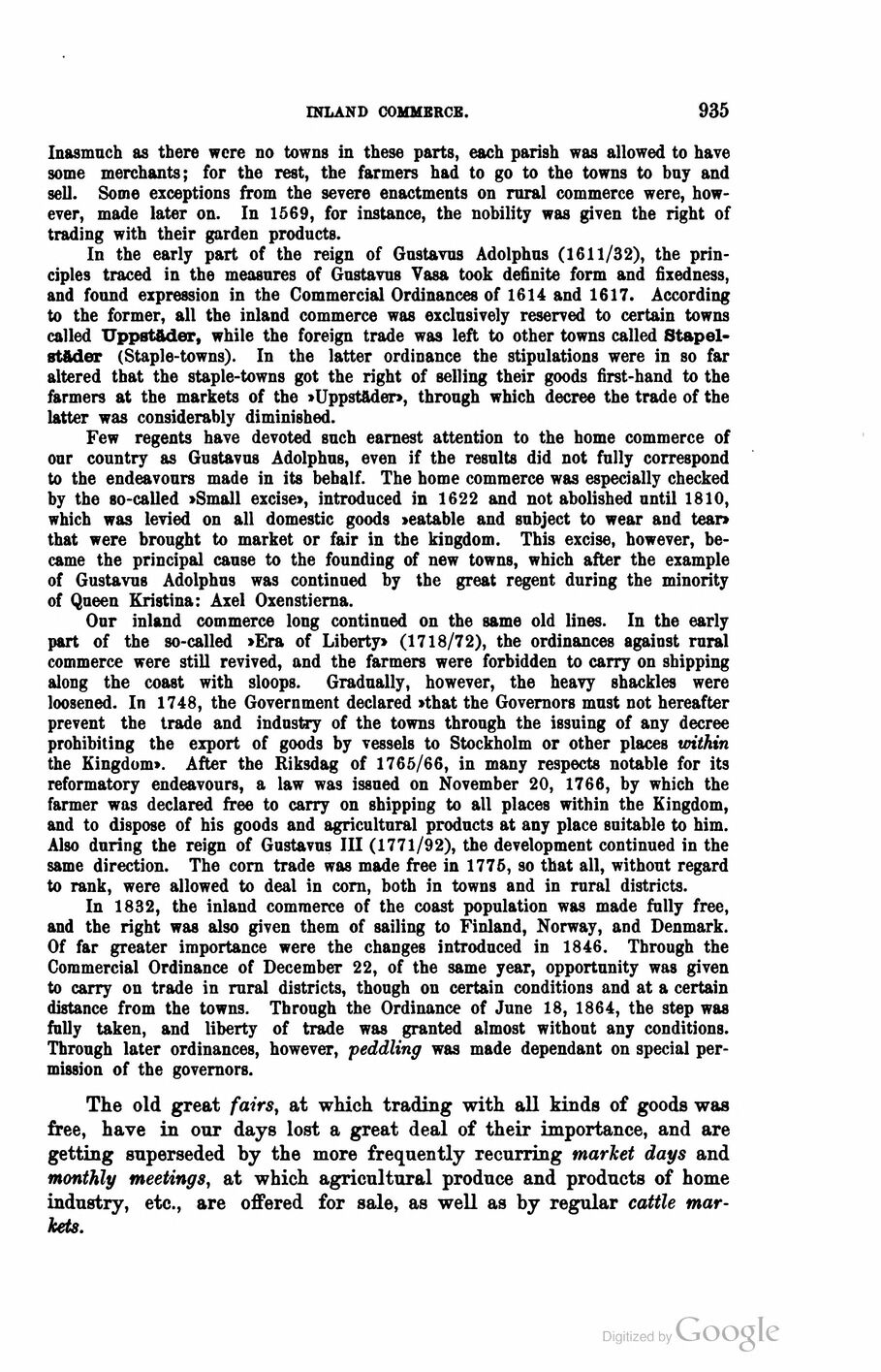
Full resolution (JPEG) - On this page / på denna sida - Second part - XI. Commerce - Inland Commerce, by L. G. Tidander, C. E., Stockholm

<< prev. page << föreg. sida << >> nästa sida >> next page >>
Below is the raw OCR text
from the above scanned image.
Do you see an error? Proofread the page now!
Här nedan syns maskintolkade texten från faksimilbilden ovan.
Ser du något fel? Korrekturläs sidan nu!
This page has never been proofread. / Denna sida har aldrig korrekturlästs.
INLAND COMMERCE.
935
Inasmuch as there were no towns in these parts, each parish was allowed to have
some merchants; for the rest, the farmers had to go to the towns to buy and
sell. Some exceptions from the severe enactments on rural commerce were,
however, made later on. In 1569, for instance, the nobility was given the right of
trading with their garden products.
In the early part of the reign of Gustavus Adolphus (1611/32), the
principles traced in the measures of Gustavus Vasa took definite form and fixedness,
and found expression in the Commercial Ordinances of 1614 and 1617. According
to the former, all the inland commerce was exclusively reserved to certain towns
called Uppstäder, while the foreign trade was left to other towns called
Stapelstäder (Staple-towns). In the latter ordinance the stipulations were in so far
altered that the staple-towns got the right of selling their goods first-hand to the
farmers at the markets of the »Uppstäder», through which decree the trade of the
latter was considerably diminished.
Few regents have devoted such earnest attention to the home commerce of
our country as Gustavus Adolphus, even if the results did not fully correspond
to the endeavours made in its behalf. The home commerce was especially checked
by the so-called »Small excise», introduced in 1622 and not abolished until 1810,
which was levied on all domestic goods »eatable and subject to wear and tear»
that were brought to market or fair in the kingdom. This excise, however,
became the principal cause to the founding of new towns, which after the example
of Gustavus Adolphus was continued by the great regent during the minority
of Queen Kristina: Axel Oxenstierna.
Onr inland commerce long continued on the same old lines. In the early
part of the so-called »Era of Liberty» (1718/72), the ordinances against rural
commerce were still revived, and the farmers were forbidden to carry on shipping
along the coast with sloops. Gradually, however, the heavy shackles were
loosened. In 1748, the Government declared »that the Governors must not hereafter
prevent the trade and industry of the towns through the issuing of any decree
prohibiting the export of goods by vessels to Stockholm or other places within
the Kingdom». After the Riksdag of 1765/66, in many respects notable for its
reformatory endeavours, a law was issued on November 20, 1766, by which the
farmer was declared free to carry on shipping to all places within the Kingdom,
and to dispose of his goods and agricultural products at any place suitable to him.
Also during the reign of Gustavus III (1771/92), the development continued in the
same direction. The corn trade was made free in 1775, so that all, without regard
to rank, were allowed to deal in corn, both in towns and in rural districts.
In 1832, the inland commerce of the coast population was made fully free,
and the right was also given them of sailing to Finland, Norway, and Denmark.
Of far greater importance were the changes introduced in 1846. Through the
Commercial Ordinance of December 22, of the same year, opportunity was given
to carry on trade in rural districts, though on certain conditions and at a certain
distance from the towns. Through the Ordinance of June 18, 1864, the step was
fully taken, and liberty of trade was granted almost without any conditions.
Through later ordinances, however, -peddling was made dependant on special
permission of the governors.
The old great fairs, at which trading with all kinds of goods was
free, have in our days lost a great deal of their importance, and are
getting superseded by the more frequently recurring market days and
monthly meetings, at which agricultural produce and products of home
industry, etc., are offered for sale, as well as by regular cattle
markets.
<< prev. page << föreg. sida << >> nästa sida >> next page >>